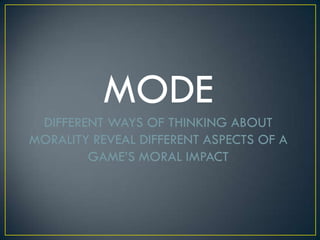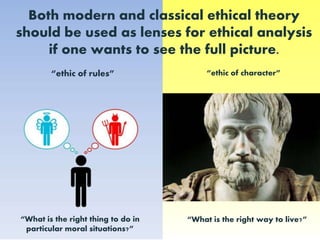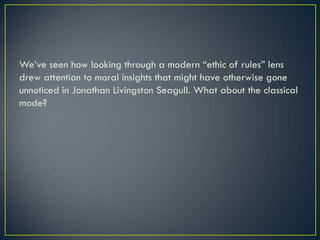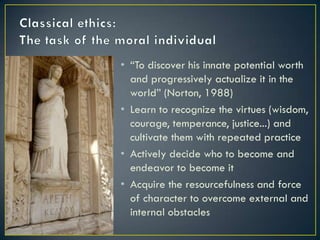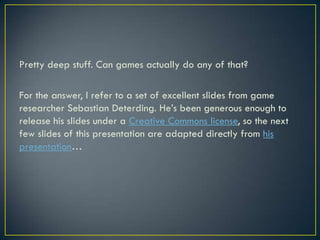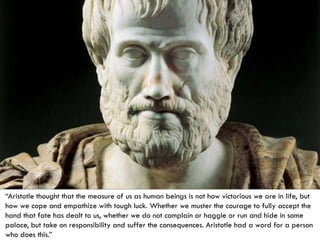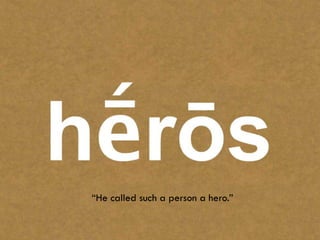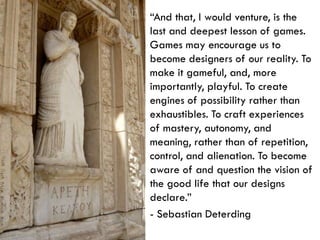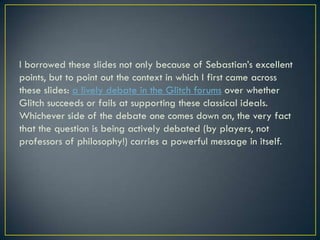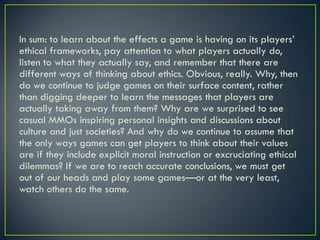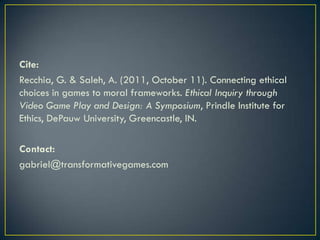Connecting Ethical Choices in Games to Moral Frameworks
- 1. Connecting Ethical Choices in GamesTo Moral FrameworksGabriel RecchiaAsmalinaSalehIndiana University, Bloomington
- 2. The claim:Games have moral impactThey can make players more aware of their own values, and even change them...and not always in the ways you might expect
- 3. THREE THINGSto pay attention to if you want to learn the effect a game is having on its playersŌĆ”
- 4. PROCESSHow does the game actually play out? WhatŌĆÖs the in-game experience like?METAGAMEWhat do players say about these experiences, both in and out of the game?MODEHow do different ways of thinking about morality reveal different aspects of a gameŌĆÖs moral impact?
- 6. This is Jonathan Livingston Seagull: the board game. Produced by Mattel in 1973.For those unfamiliar with the title, this was an extremely popular book from the early 70s, a fable about achieving moral and spiritual perfection via the rejection of conformity and the cultivation of virtue.
- 7. The first player to reach ŌĆ£perfectionŌĆØ wins the game. A little bit easier in the game than in real life, but still not trivial: YouŌĆÖll need to reach the outermost circle, and then play a ŌĆ£loveŌĆØ card. Love, it turns out, is a scarce resource.
- 8. My strategy: Collect every love card in the game early on, preventing my opponent from getting the one card heŌĆÖd need to win the game. The unintended result: An insanely long game that I was nearly guaranteed to win despite the fact that my opponent was far ahead of me, and a bit of an argumentŌĆ”
- 9. Me:ŌĆ£Even if I donŌĆÖt have anything but love in my hand, I have one free card that I can gradually use to get what I need to move to the outer circleŌĆōand youŌĆÖve got no way to get any love as long as I hoard all of it in my hand. At this rate, IŌĆÖll eventually make it to the outer circle and win, even if it takes all day. (And it will, so feel free to resign anytime.)ŌĆØ
- 10. My opponent:ŌĆ£YouŌĆÖre mad with un-power.ŌĆØŌĆ£Play the game the way itŌĆÖs meant to be played.ŌĆØ
- 11. We decided to call it a draw, but the argument bothered me: I felt I was in the right, but somehow felt a little guilty, too. I later realized I had two competing valuesŌĆ”ŌĆ£Play to winŌĆØvs. ŌĆ£Play by the spirit of the rulesŌĆØ
- 12. ŌĆ”and weŌĆÖd resolved the conflict by devising a new rule:ŌĆ£Play to winŌĆØvs. ŌĆ£Play by the spirit of the rulesŌĆØŌĆ£Agree to stop playing if people are getting upsetŌĆØ
- 13. DesignerŌĆÖs intended outcomePlayers gain greater awareness and appreciation of traditional virtuesPlayers learn the importance of various virtues as stepping stones to moral excellence
- 14. Actual outcomeGained greater awareness of my own values, expressed as explicit rules (ŌĆ£Play to winŌĆØ; ŌĆ£play by the spirit of the rulesŌĆØ)Devised a rule for resolving conflicts among values in particular situations in a way congruent with a higher moral principle (ŌĆ£Consider agreeing to stop playing if people are getting upsetŌĆØ)
- 15. PROCESSIf youŌĆÖd only paid attention to the rules and aesthetics without watching the way an actual game played out, youŌĆÖd reach a rather skewed conclusion about the moral impact of this game.METAGAMEIf youŌĆÖd only paid attention to the way the game played out without paying attention to our argument or our reflections after the game, youŌĆÖd reach a similarly incomplete conclusion.MODEEmploying more than one mode of ethical theorizing is important if you want to see the full picture. Lemme ŌĆśsplainŌĆ”
- 16. Classical ethics(ŌĆ£ethics of virtue,ŌĆØ ŌĆ£ethics of characterŌĆØ)ŌĆ£What is the right way to live?ŌĆØ
- 17. Classical ethics:The task of the moral individualfrom Norton, D. (1988). Moral minimalism and the development of moral character. Midwest Studies in Philosophy, volume 13.ŌĆ£To discover his innate potential worth and progressively actualize it in the worldŌĆØLearn to recognize the virtues (wisdom, courage, temperance, justice...) and cultivate them with repeated practiceActively decide who to become and endeavor to become itŌĆ£Acquire the resourcefulness and force of character to overcome external and internal obstaclesŌĆØ
- 18. Modern ethics(ŌĆ£ethics of rules,ŌĆØ ŌĆ£quandary ethicsŌĆØ)ŌĆ£What is the right thing to do in particular (moral) situations?ŌĆØ
- 19. Modern ethics:The task of the moral individualRecognize moral principles and rules of behavior that are consistent with themUse reasoning to determine which rules, if any, apply in particular situationsTake the action most consistent with the applicable rules
- 20. Modern ethics:The task of the moral individuali.e., exactly what my friend and I got a crash course inŌĆ”
- 21. Although the intended outcome of the game (conceptualized in classical terms) clearly failed, thinking in terms of the modern mode revealed a sharpening of ethical awareness that could otherwise have gone unnoticed.Next: More on process and metagame, and the importance of the classical mode.
- 23. LOOK AT WHAT ACTUALLY HAPPENS WHEN PEOPLE PLAY.ŌĆ£CanŌĆÖt we make inferences about the moral impact of a game based on its rules, content, and so on? Do we really have to trudge through acres of real gameplay data?ŌĆØ
- 24. LOOK AT WHAT ACTUALLY HAPPENS WHEN PEOPLE PLAY.ŌĆ£CanŌĆÖt we make inferences about the moral impact of a game based on its rules, content, and so on? Do we really have to trudge through acres of real gameplay data?ŌĆØ Yes, we do, because nearly everything we find interesting about games is an emergent property. JesperJuul (2002) differentiates between three kinds of emergence in gamesŌĆ”
- 25. Rule interactionSituations not predicted by the game designers, but easily derivable from the game rules
- 26. CombinationThe variety of possible states and game sessions that a game's rules allow
- 27. Emergent strategies(ŌĆ£trueŌĆØ emergence)Truly emergent properties that are not immediately deductible from the game rules
- 28. The point? If a simple rule interaction in a board game can completely alter its moral impact, weŌĆÖve got no chance of predicting truly emergent strategies and the impact theyŌĆÖll have on players. The best we can do is to roll up our sleeves and watch what actually goes on in the game. As well as what goes on in the forums, as weŌĆÖll see nextŌĆ”
- 29. METAGAMEHEAR WHAT PLAYERS SAY
- 30. DONŌĆÖT IGNORE WHAT HAPPENS OUTSIDE THE GAME.Some of the most important opportunities for self-examination happen not inside the game, but outside itŌĆöwhen we speak about it with others, or reflect on our in-game experiences.
- 31. Glitch
- 32. Glitch
- 33. ŌĆ£The symposium [that this presentation was composed for] will consider the claims that video games might serve as a platform for ethical inquiry, that they offer a new means of investigating social relations between human beings, and that their interactive capabilities allow them to act as mirrors for self-examinationŌĆ”ŌĆØDoes Glitch do any of these things? Even after playing it for several hours, itŌĆÖs unlikely you would notice much that would allow you to answer in the affirmative. But spend a little time in the forums, and you get a very different impressionŌĆ”
- 34. Glitch: a ŌĆ£game about cultureŌĆØForum threads frequently explore questions such asŌĆ”What kind of society do we want?What kind of behavior do we want to encourage or discourage?What should be permitted vs. disallowed?How do we strike the right balance between transmitting existing norms and traditions to new players, and allowing them to shape their own?
- 35. A few quotes from the forumsŌĆ”ŌĆ£Someone mined my rock ŌĆō OK or not OK? I waited 3 hours for this herb which someone came along and swiped ŌĆō OK or not OK? I left 900 beers at a party and someone grabbed all of them, knowing that what they were doing was wrong because they actively tried to elude us ŌĆō OK or not OK?ŌĆØŌĆ£This is a game about culture, and we are that culture [...] This is a social game, and as we get into our groove and become more social IN it, a culture will be built on top of [it].ŌĆØMy favorite example of forum posts/comments revealing how games can serve as ŌĆ£mirrors for self-examinationŌĆØ: ŌĆ£A Stunning Realization: Why I Like GlitchŌĆØ
- 36. ŌĆ£The symposium [that this presentation was composed for] will consider the claims that video games might serve as a platform for ethical inquiry, that they offer a new means of investigating social relations between human beings, and that their interactive capabilities allow them to act as mirrors for self-examinationŌĆ”ŌĆØBy paying attention to metagame and the actual gameplay (rather than just rules and game content), we can see evidence for all of the above. Finally, letŌĆÖs turn toŌĆ”
- 37. MODEDIFFERENT WAYS OF THINKING ABOUT MORALITY REVEAL DIFFERENT ASPECTS OF A GAMEŌĆÖS MORAL IMPACT
- 38. Both modern and classical ethical theory should be used as lenses for ethical analysis if one wants to see the full picture.ŌĆ£ethic of characterŌĆØŌĆ£ethic of rulesŌĆØŌĆ£What is the right thing to do in particular moral situations?ŌĆØŌĆ£What is the right way to live?ŌĆØ
- 39. WeŌĆÖve seen how looking through a modern ŌĆ£ethic of rulesŌĆØ lens drew attention to moral insights that might have otherwise gone unnoticed in Jonathan Livingston Seagull. What about the classical mode?
- 40. Classical ethics:The task of the moral individualŌĆ£To discover his innate potential worth and progressively actualize it in the worldŌĆØ (Norton, 1988)Learn to recognize the virtues (wisdom, courage, temperance, justice...) and cultivate them with repeated practiceActively decide who to become and endeavor to become itAcquire the resourcefulness and force of character to overcome external and internal obstacles
- 41. Pretty deep stuff. Can games actually do any of that?For the answer, I refer to a set of excellent slides from game researcher Sebastian Deterding. HeŌĆÖs been generous enough to release his slides under a Creative Commons license, so the next few slides of this presentation are adapted directly from his presentationŌĆ”
- 42. ŌĆ£Aristotle thought that the measure of us as human beings is not how victorious we are in life, but how we cope and empathize with tough luck. Whether we muster the courage to fully accept the hand that fate has dealt to us, whether we do not complain or haggle or run and hide in some palace, but take on responsibility and suffer the consequences. Aristotle had a word for a person who does this.ŌĆØ
- 43. ŌĆ£He called such a person a hero.ŌĆØ
- 44. ŌĆ£And that, I would venture, is the last and deepest lesson of games. Games may encourage us to become designers of our reality. To make it gameful, and, more importantly, playful. To create engines of possibility rather than exhaustibles. To craft experiences of mastery, autonomy, and meaning, rather than of repetition, control, and alienation. To become aware of and question the vision of the good life that our designs declare.ŌĆØ- Sebastian Deterding
- 45. I borrowed these slides not only because of SebastianŌĆÖs excellent points, but to point out the context in which I first came across these slides: a lively debate in the Glitch forums over whether Glitch succeeds or fails at supporting these classical ideals. Whichever side of the debate one comes down on, the very fact that the question is being actively debated (by players, not professors of philosophy!) carries a powerful message in itself.
- 46. In sum: to learn about the effects a game is having on its playersŌĆÖ ethical frameworks, pay attention to what players actually do, listen to what they actually say, and remember that there are different ways of thinking about ethics. Obvious, really. Why, then do we continue to judge games on their surface content, rather than digging deeper to learn the messages that players are actually taking away from them? Why are we surprised to see casual MMOs inspiring personal insights and discussions about culture and just societies? And why do we continue to assume that the only ways games can get players to think about their values are if they include explicit moral instruction or excruciating ethical dilemmas? If we are to reach accurate conclusions, we must get out of our heads and play some gamesŌĆöor at the very least, watch others do the same.
- 47. Cite: Recchia, G. & Saleh, A. (2011, October 11). Connecting ethical choices in games to moral frameworks. Ethical Inquiry through Video Game Play and Design: A Symposium, Prindle Institute for Ethics, DePauw University, Greencastle, IN. Contact: gabriel@transformativegames.com

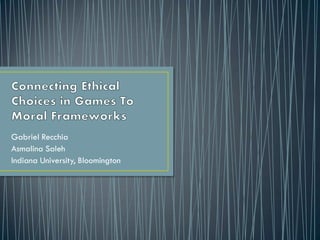
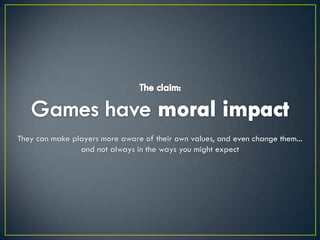
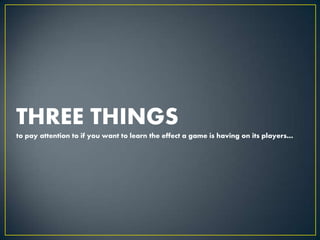
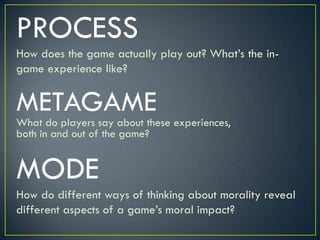

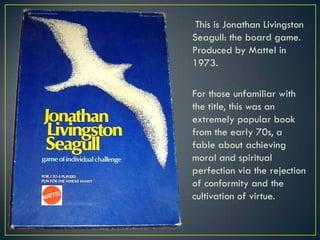
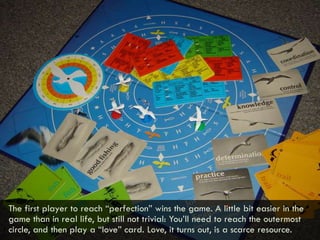

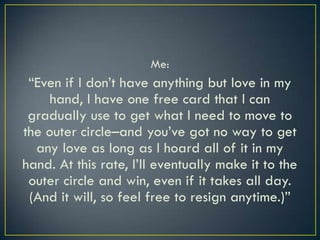
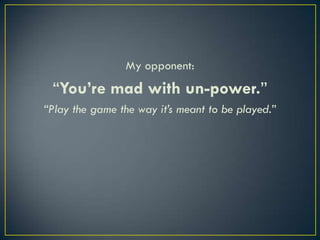

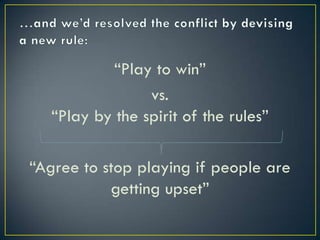
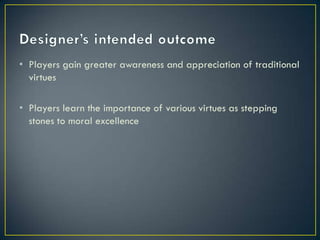
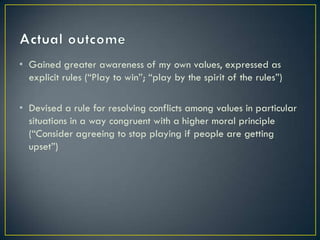
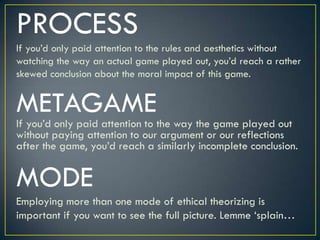
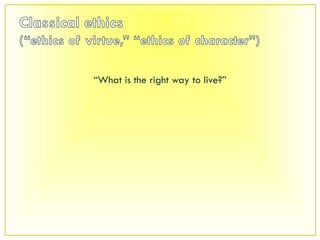
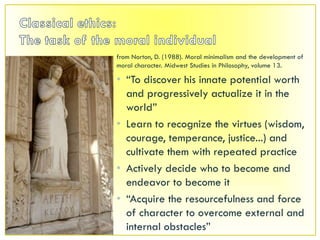
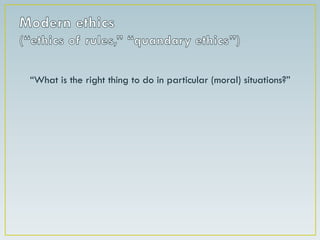
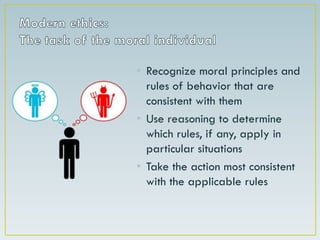
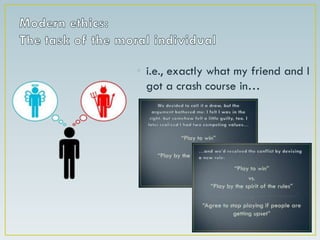
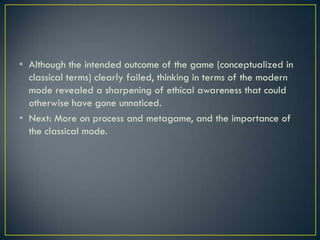
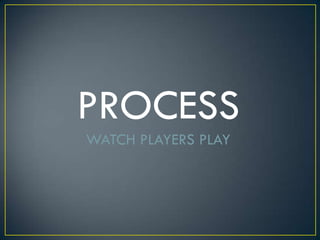
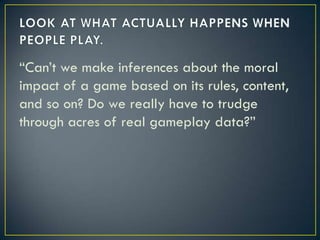
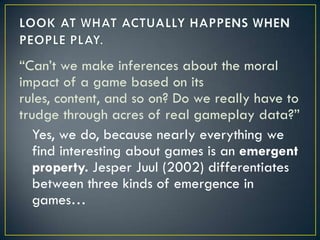
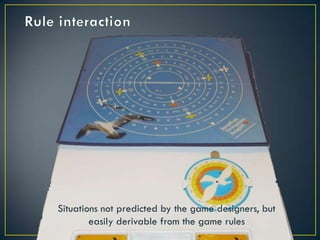

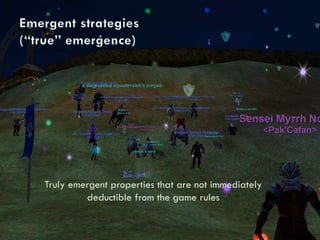
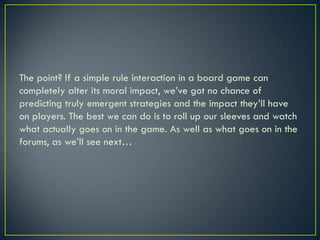
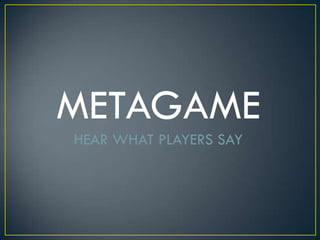
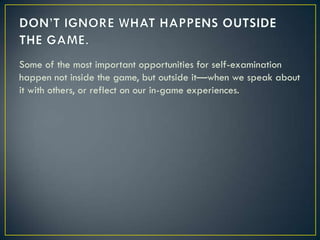
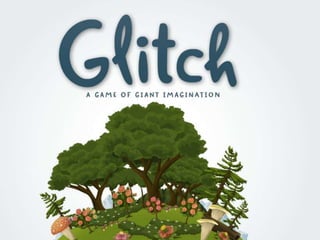
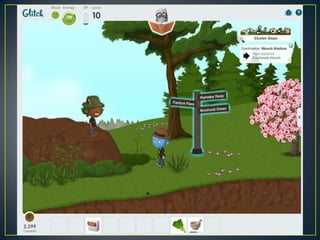
![ŌĆ£The symposium [that this presentation was composed for] will consider the claims that video games might serve as a platform for ethical inquiry, that they offer a new means of investigating social relations between human beings, and that their interactive capabilities allow them to act as mirrors for self-examinationŌĆ”ŌĆØDoes Glitch do any of these things? Even after playing it for several hours, itŌĆÖs unlikely you would notice much that would allow you to answer in the affirmative. But spend a little time in the forums, and you get a very different impressionŌĆ”](https://image.slidesharecdn.com/connectingethicalchoicesingamestomoralframeworks-111015153832-phpapp01/85/Connecting-Ethical-Choices-in-Games-to-Moral-Frameworks-33-320.jpg)
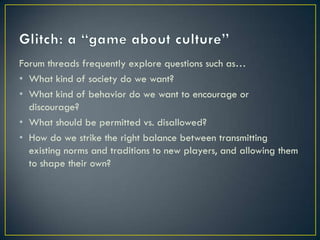
![A few quotes from the forumsŌĆ”ŌĆ£Someone mined my rock ŌĆō OK or not OK? I waited 3 hours for this herb which someone came along and swiped ŌĆō OK or not OK? I left 900 beers at a party and someone grabbed all of them, knowing that what they were doing was wrong because they actively tried to elude us ŌĆō OK or not OK?ŌĆØŌĆ£This is a game about culture, and we are that culture [...] This is a social game, and as we get into our groove and become more social IN it, a culture will be built on top of [it].ŌĆØMy favorite example of forum posts/comments revealing how games can serve as ŌĆ£mirrors for self-examinationŌĆØ: ŌĆ£A Stunning Realization: Why I Like GlitchŌĆØ](https://image.slidesharecdn.com/connectingethicalchoicesingamestomoralframeworks-111015153832-phpapp01/85/Connecting-Ethical-Choices-in-Games-to-Moral-Frameworks-35-320.jpg)
![ŌĆ£The symposium [that this presentation was composed for] will consider the claims that video games might serve as a platform for ethical inquiry, that they offer a new means of investigating social relations between human beings, and that their interactive capabilities allow them to act as mirrors for self-examinationŌĆ”ŌĆØBy paying attention to metagame and the actual gameplay (rather than just rules and game content), we can see evidence for all of the above. Finally, letŌĆÖs turn toŌĆ”](https://image.slidesharecdn.com/connectingethicalchoicesingamestomoralframeworks-111015153832-phpapp01/85/Connecting-Ethical-Choices-in-Games-to-Moral-Frameworks-36-320.jpg)
